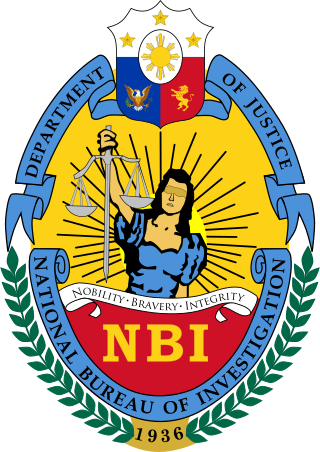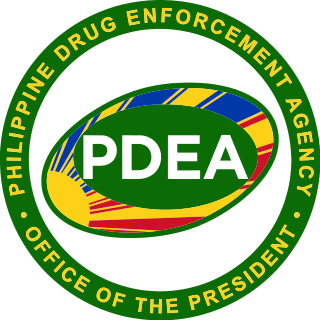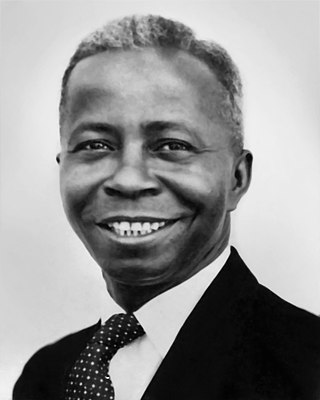
The National Security Agency (NSA) is an intelligence agency of the United States Department of Defense, under the authority of the Director of National Intelligence (DNI). The NSA is responsible for global monitoring, collection, and processing of information and data for foreign intelligence and counterintelligence purposes, specializing in a discipline known as signals intelligence (SIGINT). The NSA is also tasked with the protection of U.S. communications networks and information systems. The NSA relies on a variety of measures to accomplish its mission, the majority of which are clandestine. The NSA has roughly 32,000 employees.

The Defense Intelligence Agency (DIA) is an intelligence agency and combat support agency of the United States Department of Defense, specializing in defense and military intelligence.

William Richard Tolbert Jr. was a Liberian politician who served as the 20th president of Liberia from 1971 until his assassination in 1980.
A security agency is a governmental organization that conducts intelligence activities for the internal security of a nation. They are the domestic cousins of foreign intelligence agencies, and typically conduct counterintelligence to thwart other countries' foreign intelligence efforts.

The United Kingdom – United States of America Agreement is a multilateral agreement for cooperation in signals intelligence between Australia, Canada, New Zealand, the United Kingdom, and the United States. The alliance of intelligence operations is also known as the Five Eyes. In classification markings this is abbreviated as FVEY, with the individual countries being abbreviated as AUS, CAN, NZL, GBR, and USA, respectively.

The National Bureau of Investigation is an agency of the Philippine government under the Department of Justice, responsible for handling and solving major high-profile cases that are in the interest of the nation.

The Directorate of Operations (DO), less formally called the Clandestine Service, is a component of the US Central Intelligence Agency. It was known as the Directorate of Plans from 1951 to 1973; as the Directorate of Operations from 1973 to 2005; and as the National Clandestine Service (NCS) from 2005 to 2015.

The Danish Defence Intelligence Service is a Danish intelligence agency, responsible for Denmark's foreign intelligence, as well as being the Danish military intelligence service. DDIS is an agency under the Ministry of Defence and works under the responsibility of the Minister of Defence. It is housed at Kastellet, Copenhagen.
Project SHAMROCK was the sister project to Project MINARET, an espionage exercise started in August 1945. Project MINARET involved the accumulation of all telegraphic data that entered or exited the United States. The Armed Forces Security Agency (AFSA) and its successor, the National Security Agency (NSA), were given direct access to daily microfilm copies of all incoming, outgoing, and transiting telegrams via the Western Union and its associates RCA and ITT. NSA did the operational interception, and, if there was information that would be of interest to other intelligence agencies, the material was passed to them. Intercepted messages were disseminated to the FBI, CIA, Secret Service, Bureau of Narcotics and Dangerous Drugs (BNDD), and the Department of Defense. No court authorized the operation and there were no warrants.

The National Intelligence Coordinating Agency (NICA) is the primary intelligence gathering and analysis arm of the Government of the Philippines in charge of carrying out overt, covert, and clandestine intelligence activities. The NICA directs, coordinates, and integrates all intelligence activities, both foreign and domestic, concerning national security, serving as the leading intelligence collector of the national government, focusing on the country's strategic intelligence requirements. It is mandated to prepare intelligence estimate on local and foreign situation for the formulation of national security policies by the President and the National Security Council.

The National Bureau of Investigation (NBI) is a national law enforcement agency of the Finnish Police and the principal criminal investigation and criminal intelligence organization of Finland. The Bureau's main tasks are to counter and investigate organized crime, provide expert services, and develop methods for criminal investigation. NBI is also responsible for financial intelligence (FININT), such as preventing money laundering and terrorism financing. NBI headquarters has been situated in the city of Vantaa within the Capital Region since 1994 with field offices in Tampere, Turku, Mariehamn, Joensuu, Oulu and Rovaniemi. It is subordinate to the National Police Board under the jurisdiction of the Interior Ministry.

The Philippine Drug Enforcement Agency is the lead anti-drug law enforcement agency, responsible for preventing, investigating and combating any dangerous drugs, controlled precursors and essential chemicals within the Philippines. The agency is tasked with the enforcement of the penal and regulatory provisions of Republic Act No. 9165, otherwise known as the Comprehensive Dangerous Drugs Act of 2002.
The Dulles–Jackson–Correa Report was one of the most influential evaluations of the functioning of the United States Intelligence Community, and in particular, the Central Intelligence Agency (CIA). The report focused primarily on the coordination and organization of the CIA and offered suggestions that refined the US intelligence effort in the early stages of the Cold War.
The Schlesinger Report, originally titled A Review of the Intelligence Community, was the product of a survey authorized by U.S. President Richard Nixon late in 1970. The objective of the survey was to identify and alleviate factors of ineffectiveness within the United States Intelligence Community (IC) organization, planning, and preparedness for future growth. The report, prepared by James Schlesinger, Deputy Director of the Office of Management and Budget (OMB), was submitted to Nixon on 10 March 1971.
At various times since the creation of the Central Intelligence Agency, the Federal government of the United States has produced comprehensive reports on CIA actions that marked historical watersheds in how CIA went about trying to fulfill its vague charter purposes from 1947. These reports were the result of internal or presidential studies, external investigations by congressional committees or other arms of the Federal government of the United States, or even the simple releases and declassification of large quantities of documents by the CIA.
The Central Intelligence Agency (CIA), a United States intelligence agency that "provides objective intelligence on foreign countries", also informally referred to as the Agency. The CIA is part of the United States Intelligence Community, is organized into numerus divisions. The divisions include directors, deputy directors, and offices. The CIA board is made up of five distinct entitles called Directorates. The CIA is overseen by the Director of Central Intelligence. Under the Director of Central Intelligence is the Deputy Director of Central Intelligence. Under this the CIA is divided into four directorates. These directorates are as follows:

Edison Reginald Townsend was a Liberian journalist and statesman known for the establishment of Liberia's Information Services. He served as Secretary of Information and Cultural Affairs under President William Tubman, and as Minister of State for Presidential Affairs under President William Tolbert. In 1979 he was elected National Chairman of the True Whig Party. Following the 1980 Liberian coup d'état of President Tolbert on April 12, 1980, he and several other members of the Tolbert administration were put on trial and without due process executed by firing squad on April 22, 1980.

Liberia–Soviet relations were the bilateral relations between Liberia and Soviet Union. Contacts between the two countries were sporadic during the 1950s and 1960s, improved during the 1970s but became frosty in the 1980s.

The National Intelligence and Security Service (NISS) is an Intelligence agency of the Ethiopian federal government tasked to defend, protect and advance the National Security and Interests of Ethiopia. It collects, analyze and disseminate intelligence for decision makers. It also is one of two national law enforcement agencies, in Ethiopia next to the Federal Police Commission. It tackles drug trafficking, cybercrime, arms trafficking, human, and other domestic or international organized crime.













